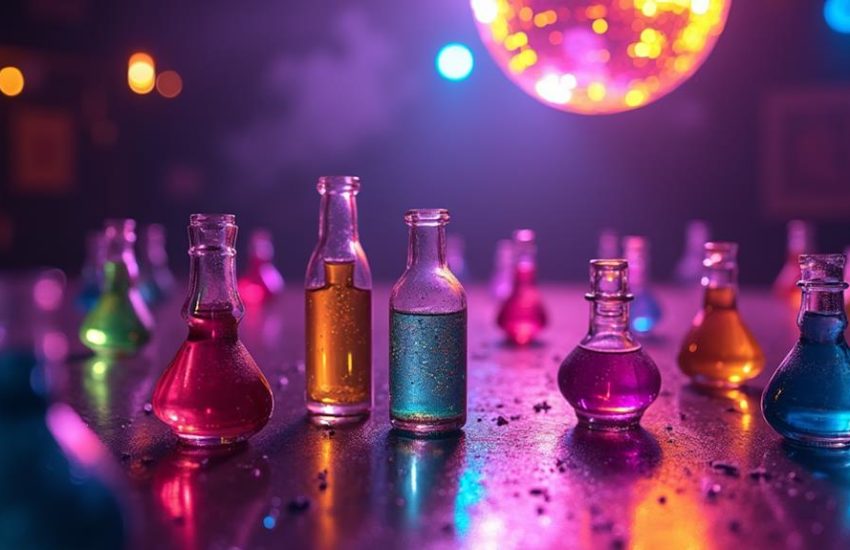Russian Roulette in a Bottle: The Risky Chemicals in Your Poppers
Poppers, primarily composed of alkyl nitrites, are volatile organic compounds that vaporize rapidly at room temperature. Their unstable chemical nature and lack of regulation in manufacturing expose users to potentially harmful byproducts. Immediate effects include severe headaches, dizziness, and temporary vision loss, whereas prolonged use can damage the immune system and increase infection susceptibility. The legal status of poppers varies globally, complicating regulation efforts. Health risks range from nausea and rapid heartbeat to more severe conditions like methemoglobinemia. In spite of their popularity, the chemical composition of poppers makes them a risky substance for recreational use. Further exploration reveals alternative options and recovery resources for those affected.
The Chemistry Behind Poppers
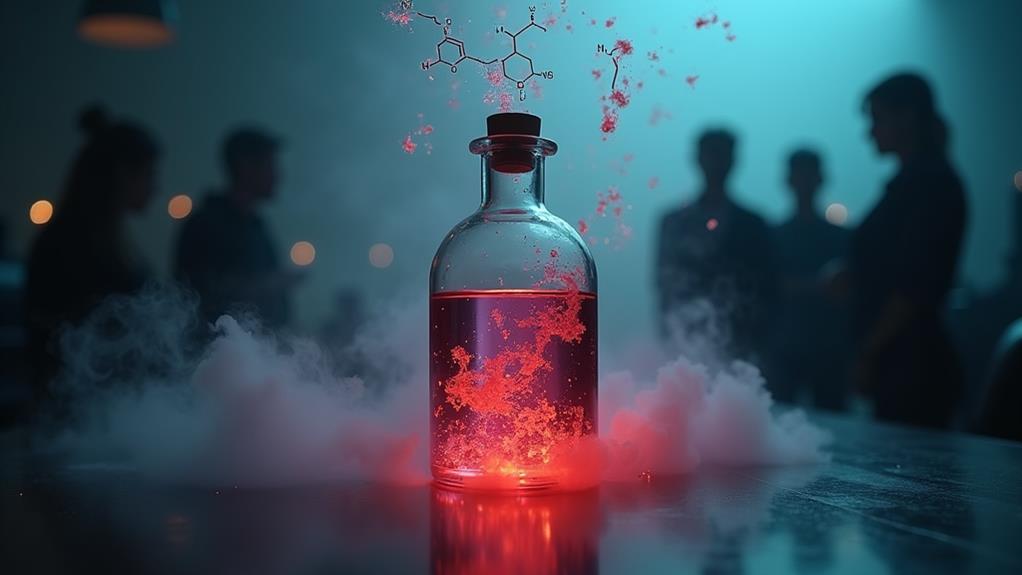
Poppers, primarily composed of alkyl nitrites, are volatile organic compounds that rapidly vaporize at room temperature. Their chemical composition typically includes isopropyl nitrite, isobutyl nitrite, or amyl nitrite.
These volatile solvents are highly reactive, breaking down quickly when exposed to air or dampness. The inhalation of poppers leads to rapid absorption through the lungs, causing an immediate rush of blood to the head and a temporary drop in blood pressure. This physiological response is responsible for the brief euphoria and muscle relaxation experienced by users.
The instability of alkyl nitrites contributes to their short shelf life and potential for degradation, which can lead to the formation of harmful byproducts. Additionally, the lack of regulation in their manufacturing process means that users are often exposed to unknown and potentially dangerous chemicals.
Understanding the chemistry behind poppers is vital for evaluating their risks and potential long-term effects on users.
Health Risks and Side Effects
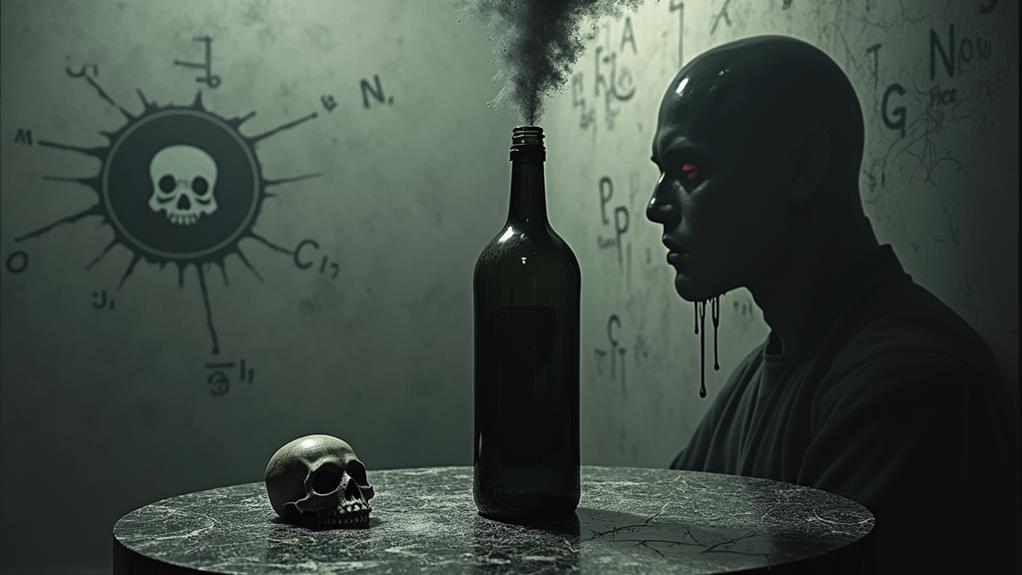
Several significant health risks and side effects are associated with the use of poppers. The inhalation of these volatile nitrites can lead to immediate health implications, including severe headaches, dizziness, and temporary vision loss.
Prolonged use may result in more serious consequences, such as damage to the immune system and increased susceptibility to infections. Users may likewise experience visual disturbances, such as seeing neon snowflakes, which can be alarming.
Furthermore, the risk of methemoglobinemia, a condition where blood's oxygen-carrying capacity is reduced, is heightened. Side effects of popper use can range from mild to severe. Common reactions include nausea, flushing of the skin, and rapid heartbeat.
In some cases, users may experience methemoglobinemia, a dangerous condition where the blood's oxygen-carrying capacity is reduced. Poppers can also interact negatively with medications, particularly those used to treat erectile dysfunction.
Regular users may develop tolerance and experience withdrawal symptoms, indicating potential for psychological dependence. Understanding these health risks is essential for those seeking a sense of belonging within communities where popper use is prevalent.
Legal Status and Regulation
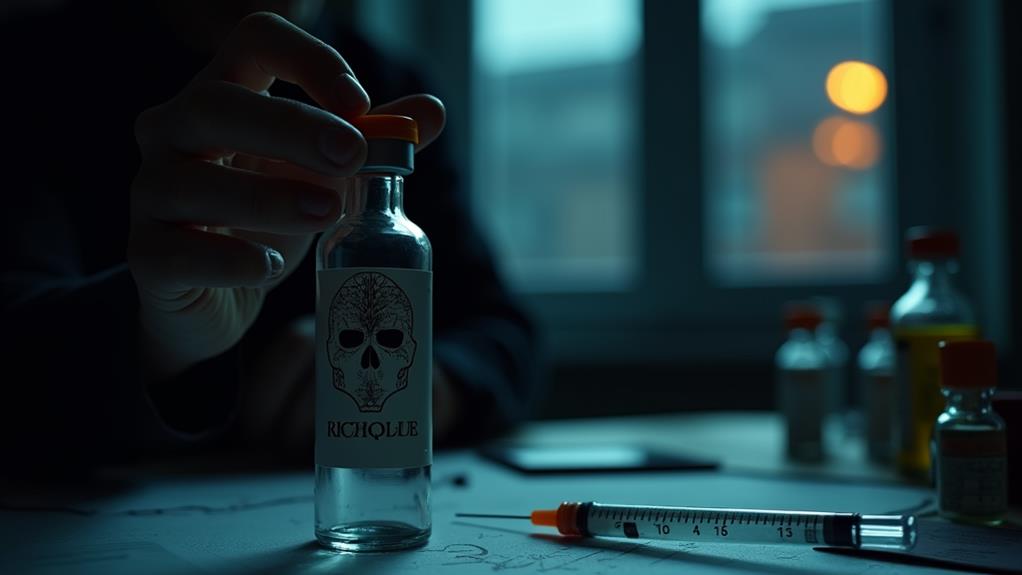
The legal status and regulation of poppers vary considerably across different countries and jurisdictions. In some nations, these substances are completely banned, whereas others allow their sale under specific conditions or for particular uses. This inconsistency creates regulatory challenges for lawmakers and enforcement agencies.
The misleading labels on poppers further complicate regulation, as the actual chemical contents often differ from what is advertised. Users are often unaware that the inhaled substance is not amyl nitrite, commonly used for Angina treatment. The legal implications of possessing or distributing poppers can range from minor infractions to serious criminal offenses, depending on local laws. Some countries classify poppers as controlled substances, whereas others regulate them as consumer products. This patchwork of regulations makes it difficult for users to understand the potential legal risks associated with their use.
Many jurisdictions struggle to balance public health concerns with personal freedom, leading to ongoing debates about the appropriate level of regulation for these substances. As research on the health effects of poppers continues to evolve, lawmakers face pressure to adapt regulations accordingly.
Alternatives to Poppers
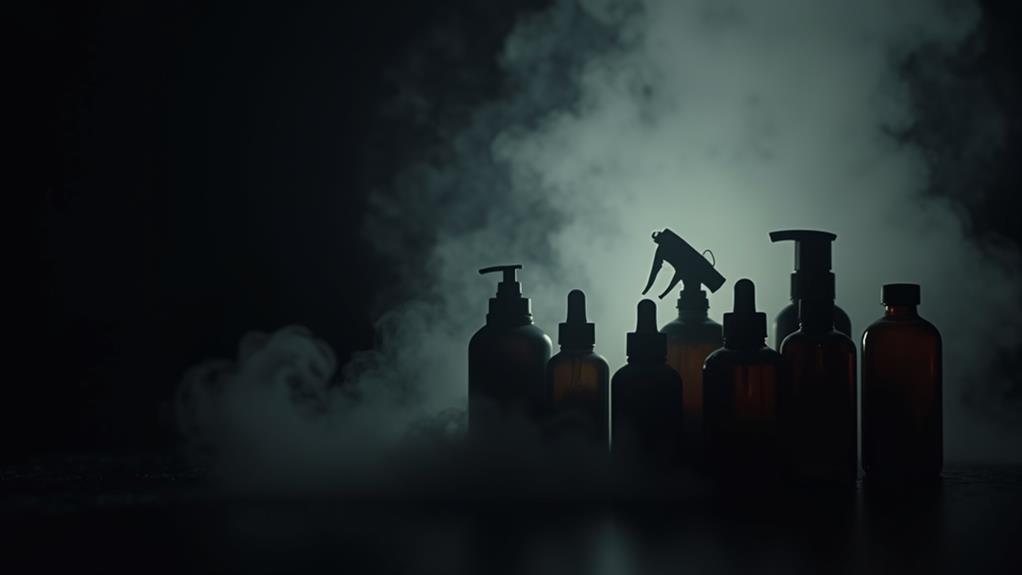
Three main categories of alternatives to poppers have emerged as users seek safer options or legal substitutes.
First, natural alternatives like vital oils and herbal blends are gaining popularity among those looking for a milder experience. These products often contain ingredients like peppermint, eucalyptus, or ginger, which may produce a mild stimulating effect.
Nevertheless, caution is advised as some individuals may experience allergic reactions or skin rashes, particularly those with sensitive skin.
Second, synthetic compounds designed to mimic the effects of poppers whilst avoiding restricted chemicals have entered the market. These "legal highs" vary in composition and efficacy.
Third, some users turn to breathing exercises or meditation techniques to achieve altered states without chemical assistance.
Although these alternatives may appeal to those seeking safer options, it's important to note that their effects and safety profiles differ from traditional poppers. Users should research thoroughly and consult healthcare professionals before trying any alternative substances.
Seeking Help and Recovery
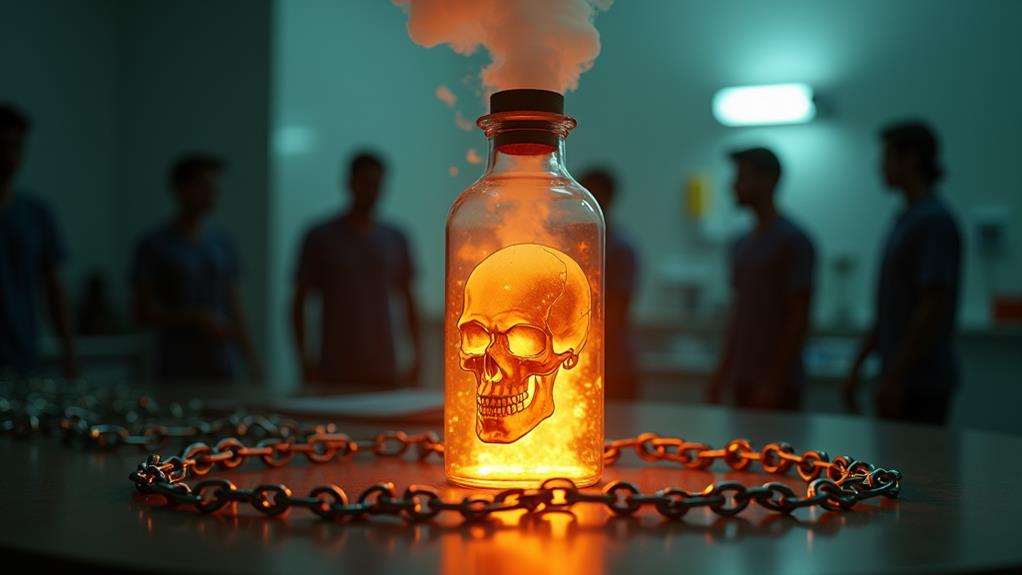
Individuals struggling with popper addiction or experiencing adverse health effects from their use have several avenues for seeking help and recovery. Medical professionals, including addiction specialists and psychiatrists, can provide targeted treatment plans and medication-assisted therapies when necessary.
Support networks, such as peer support groups and online communities, offer valuable emotional support and shared experiences. It's important to note that continued use of poppers may exacerbate eye damage, making cessation vital.
Addiction counseling, both individual and group-based, can help address underlying psychological factors contributing to substance use. Cognitive-behavioral therapy and motivational interviewing are evidence-based approaches that have shown efficacy in treating substance use disorders.
Rehabilitation centers offer structured environments for detoxification and intensive recovery programs. Holistic approaches, including mindfulness practices and stress management techniques, can complement traditional treatments.
It's essential for individuals to understand that recovery is a personalized journey, and a combination of professional help, support networks, and self-care strategies often yields the most successful outcomes.
Call Us To Assist You
Poppers remain a contentious and potentially hazardous substance, with chemical compositions that can vary widely in purity and safety. Their use carries significant health risks, particularly to cardiovascular and ocular health. As legal status differs globally, regulatory gaps persist. Safer alternatives and harm reduction strategies warrant further research and promotion. In the end, the allure of poppers' ephemeral high belies a powder keg of potential dangers. Education, support, and evidence-based approaches are essential in addressing the complex issues surrounding popper use and misuse.

